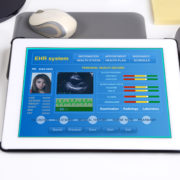Better Integrated EHR Systems Can Reduce Physician Burnout
A recent study of over 15,000 physicians found that 2/3 felt burned out from their work, with nearly a third admitting that they were more easily exasperated, less engaged and less friendly with their patients. An additional 15% felt they would make mistakes with patients that they would not normally make, including 5% that had made errors that could have led to patient harm. With today’s litigious society, physician burnout is a real problem in today’s healthcare system. One source of burnout you may not have considered, however, is your EHR system. Here’s a quick look at how your EHR system may be part of the problem.
Are your physicians suffering from burnout? Start with a look at your EHR system!
Though requirements for EHR systems have been federally mandated, that’s not the end of the issues. The requirement was developed with good intentions to improve patient care, but it’s the areas where the systems are not mandated that are creating problems. The original plan for EHR regulation was to create a record system that could be shared between healthcare systems in near real-time, reducing the potential for bad decisions in healthcare due to lack of information on a patient’s medical background. The disparity between systems and lack of interoperability are two of the biggest issues facing the modern healthcare system today.
Currently, EHR system issues are listed as one of the most common causes of physician burnout, right up there with long hours, administrative tasks and paperwork. This is especially unfortunate because the implementation of EHR systems was designed to help reduce the burden of the other three key elements in burnout. But with physicians working between multiple locations, systems or practices, EHR system issues and lack of standardization are simply adding to the problems they’re already facing.
Niki Buchanan, Phillips Health’s general manager of population health management, brings up an excellent example. “What a physician might have in their physician care practice might be Athena, or an EMR customized to their workflow or a public-type vendor. When they go in to do rounding, it’s usually an Epic or a Cerner, a large system. They have to deal with three or more EMR systems depending on how they’re caring for their patients. If there is no standardization . . . imagine the challenge of only having a few minutes for the patients and having to provide a full realm of care for them.”
By adding technology that better integrates EHR systems with other systems being used, it becomes much easier to realize the true intent of the EHR mandate by putting that much more information instantly at the fingertips of providers. One area where you’ll see some change this year is the discussion that’s starting about CPT codes being brought into better align with EHR system requirements. These discussions are also showing how CPT codes can be used in order to demonstrate remote monitoring of a patient’s healthcare data statistics.
Doctor burnout is a serious issue for any practice or healthcare system. Selecting a vendor that can provide your practice with the tools needed to get the job done effectively and efficiently by automating workflow ensures that your providers will be able to continue focusing on what really matters – treating their patients.
If you need help finding the perfect solution for your doctors, Exscribe can help. Please feel free to contact us today with any questions or sign up for a free demo of our dynamic integrated EHR solutions.











